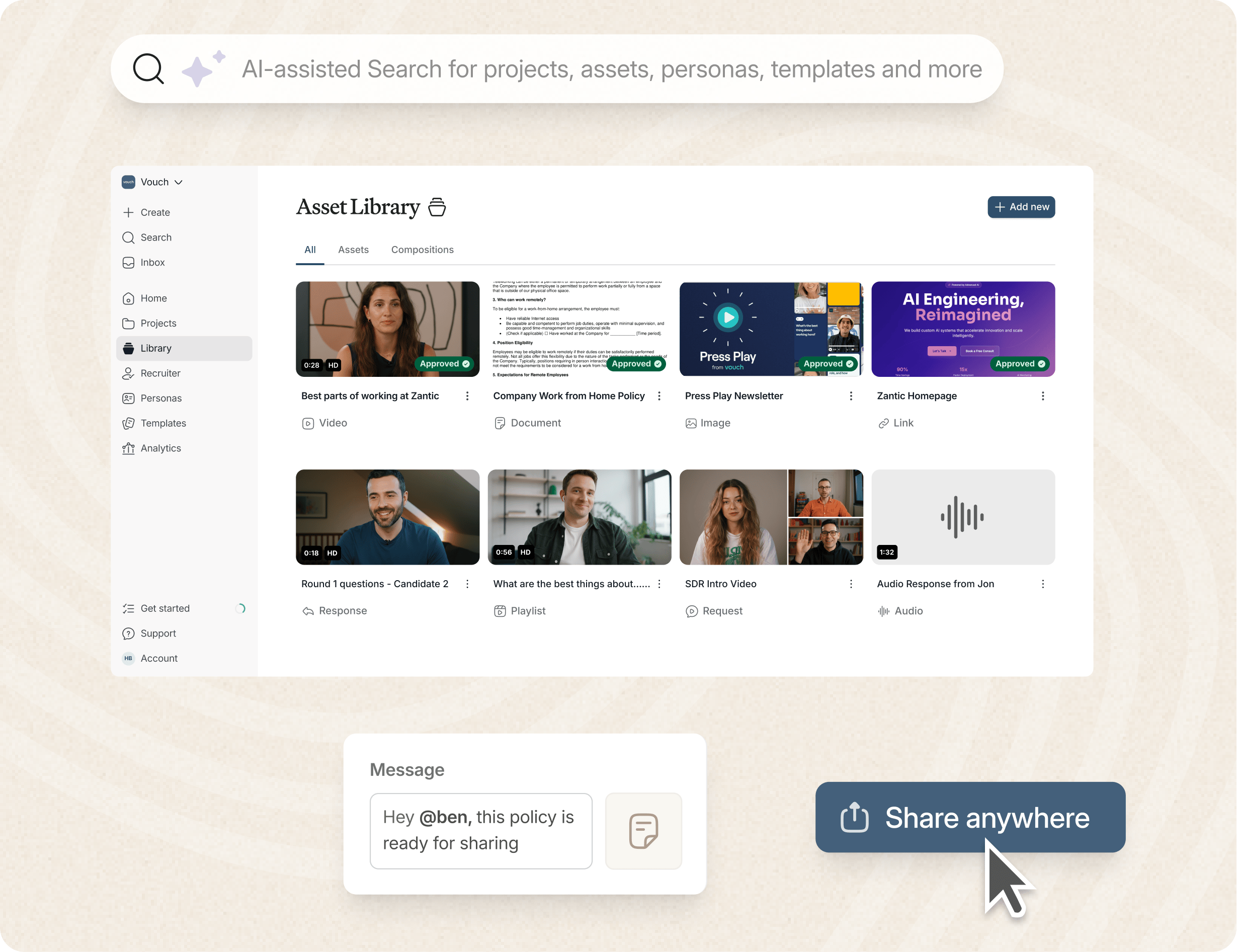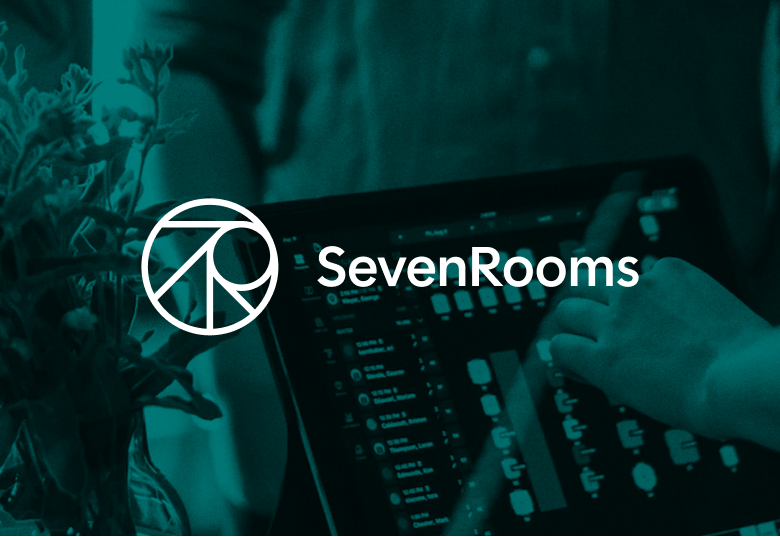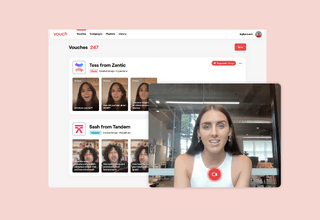Are you a sales manager, or perhaps sales team lead?
No matter what your business does or what industry you're in, there is one thing you must do. It's obvious. You need to hit sales targets.
Hitting your company's targets, however, is never easy.
This is especially true if you are in a highly competitive industry like technology, financial services or professional services - and that's where a sales coach can come into play.
In this article we dive into the pros and cons of Sales Coaches, and outline the best ways to find the perfect coach for your team!
Note: Does your company rely on attracting (and retaining) top talent? Vouch is a game-changer for brands like Amazon, Nike, Cisco, Culture Amp, HubSpot, Safety Culture, Stryker, Canva and more. Just click here to get your personal demo and grow your talent pipeline.
Let's dive in.
Article Summary:
- Why even the highest-performing salespeople invest in coaching
- How sales coaching can be measured in ROI
- Why sales coaching might be easier than you think
- How technology like Vouch can take sales coaching even further
Sales coaching, what is it?
Sales coaching can take many shapes, depending on your team size, ability, industry and the products or services you're selling.
In most cases, sales coaching is led by sales team leaders and managers.
Sales coaching can be led by your top performers, too. Just keep in mind top closers are not always top educators. They may need more patience as they would rather focus on the next deal than helping others compete with their results.
The goal is similar to understanding a client's needs, a kind of SWOT analysis.
You need to understand your salespeople's strengths and weaknesses, identify opportunities for their growth and threats if they don't grow - threats to your company's bottom line, your team's morale, and overall efficiency and effectiveness.
Sales coaching can be done in a team, one-on-one meetings, or a combination of both, which we prefer here at Vouch.
This is also where technology shines. For example, Vouch was made for salespeople, so your internal coaching is easy and real-time, even when your sales reps are in different time zones or countries. There are lots of tools around to help salespeople today.
However, as you approach your sales coaching techniques, always consider long-term goals and leverage positive reinforcement.
An underperforming sales rep today may be your best rep in 3-months time. By focusing on effective coaching, the ocean will rise, which will elevate everyone.
What kind of results does regular sales coaching achieve?
Sales Readiness Group reports that over 75% of their sales reps achieve targets in market-leading companies. Struggling companies may be lucky to hit a 25% quota. Right here, we can see the difference.
Even the world's best sales professionals invest in coaching. Enough said.
Sales performance coaching is about creating a culture of learning where all of your salespeople feel valued, respected, and like they are growing personally and in your company - no matter their performance level.
The AI-enabled workspace for talent teams.
- Unified workspace for talent teams
- Accelerate hiring with AI tools
- Auto-generate polished hiring and employer brand content
- Easily repurpose assets across all channel

So why do only some sales teams have ongoing coaching?
The main reason is that salespeople are salespeople, not teachers.
As Norman Behar puts it, many people want to avoid coaching sales or knowing how to.
Underlying this statement are, of course, a few logical reasons as to why sales coaching often gets pushed to the side, such as:
- Sales managers don't know where to start
- Coaching reps is not necessarily a sales leader's strength
- Companies don't understand the sales coaching benefits
- Companies don't budget for external training or downtime to train salespeople
- Companies have no clear path or plan, as salespeople are "experts anyway."
So, where do you start when it comes to coaching in sales?
Let's dive a little deeper!
Should you use an external sales coach?
If you can afford it, use an external sales coach, at least to start with!
Then, transition to internal training and mentoring - as your team understands the process and initially, the feedback comes from an external expert. It's just a softer start.
Sales coaches train salespeople day in and day out and can help with goal setting and understanding measurable progress.
Sales coaching goes beyond key performance indicators (KPIs) based on knowledge and constructive criticism, not just targets. Salespeople have different levels of success, and a sales coach can work out what success means for your company with fresh eyes.
We mention "fresh eyes" because this is vital in sales coaching.
Sales coaching is like sports coaching.
A new coach can pick things up that a long-term coach can't because they have become "tuned to a norm". An external sales coach will have a formal process that opens up new thoughts - and can plant a few seeds to help your sales team grow.
The key (in our experience) is to ensure your sales leaders also get a private session with the sales coach. As we'll see next - your internal salespeople can transition to coaches and mentors.
You could also continue to hire outside sales coaches. The choice is up to you and the budget at hand.
Either way, sales coaches are experts at identifying a sales team's strengths, with the tools to improve your team's weaknesses.
How do you tell a great sales coach from a bad coach?
Choosing the right sales coach for your team can be more complex. And even the world's best sales coaches can be a bad fit if you don't choose wisely and choose a coach who matches your team's culture.
If you have a good network, try reaching out for recommendations as a first step.
However, if you find a coach, a few key steps will help you get the ideal person. Here's a guide to finding the right sales coach for your company:
1. Have clear goals
Having a clear idea of your goals is everything regarding sales coaching - and this doesn't mean just increasing sales. You need to consider the specific skills, processes, behaviours, attitudes, etc. that you want to change. It's improving the process and mindset that will improve the results.
2. Check their credentials and reviews
This may be an obvious step, yet it's often overlooked. Check the sales coach has the right qualifications, experience and reputation. Request and research their sales track record and review testimonials from previous clients. Even reach out to the companies they have in their folio - an excellent way to network with other sales managers, too : )
3. Start with a trial sales coaching session
When you've narrowed down your sales coaches, there is still a good check to do. Get a private lesson from the sales coach before they help the entire team. You can personally assess at that point and gain invaluable insights into their approach and vision for your company. A good sales coach will be happy to do a trial - and if they don't, you might want to consider this a red flag.
4. Review their initial impact and style
Following your trial session, review if they hit your defined goals in step 1. This step requires you to have tangible outcomes and milestones. Remember that sales coaching is a process, as we are changing people's habits and mindsets, so consider that a good sales coach will likely inspire in the first session. Still, there is an entire process behind sales coaching - it's usually not a one-shot. You should get a good sense of their style and approach, which really matters.
The sales coach review checklists.
Now that you have your goals let's get down to the nitty-gritty.
Here's a simple checklist to help separate a great from not a great sales coach.
Please keep in mind sales coaches have their own sales strategies. This checklist will help you see through the smoke machine.
In sales coaching, it's all about the coach's attitude and approach:
7 Signs of a Great Sales Coaches:
- Did the sales coach start by listening?
- Did the sales coach have an agenda and structure for the first meeting?
- Did the coach understand your team's strengths and weaknesses?
- Did the sales coach show you how they've helped clients in similar situations?
- Did the sales coach reference data or any industry insights?
- Did you make a personal connection with the sales coach?
- Did they have a clear action plan for the next steps?
If you can answer yes to all of these, this is a great sign that you have found an excellent sales coach.
7 signs of a bad sales coach:
- Did the sales coach start by pitching their services?
- Did the sales coach use NLP or closing tactics on you?
- Did the sales coach fail to ask about your challenges and goals?
- Did the sales coach fail to ask about your team?
- Did the sales coach only ask closed (yes or no) questions?
- Did the sales coach seem under-experienced?
- Did the sales coach leave the follow-up to you?
If you answer yes to these questions, then you should look elsewhere. A big red flag is the sales coach pitching to you during the initial call. There is no need for this; a coach of any kind is there for the players (you and your team), not their own goals.
A sales coach is, in essence, a counsellor.
Look elsewhere if you didn't get that feeling on the first call.
Sales training vs. sales mentoring
We need to make a clear distinction here, sales training is not sales mentoring.
Sales training: Education for your wider sales team on sales tactics and strategies.
Sales mentoring: Ongoing peer support, usually one-on-one.
Sales coaches can perform both roles, but mentoring must be ongoing to work, and that is why many companies have internal mentors - often the sales manager or CSO. The sales manager, however, might be mentored by a sales coach (usually the best approach), so they can then, in turn, mentor the entire team.
When mentoring your internal sales team, you need to be available 24/7.
Mentoring is a real-time process; it could be at 11 p.m. when one of your reps needs help. A sales coach is not necessarily available on an ad-hoc basis like this.
This is where technology and tools like Vouch can help, an internal video platform for salespeople so you can record short videos - and provide evergreen mentoring and training. This technology can save you vast amounts of time and energy. Your sales coach can also be plugged into Vouch!
Why should you consider ongoing sales coaching?
Like every industry getting to grips with AI and social media like TikTok that is capturing Gen Z - the sales industry is rapidly evolving. That's not slowing down.
We are also facing significant economic fluctuations in 2023, and regular sales coaching is vital to setting internal sales targets. Your exec team may have goals that could be more achievable in today's climate - and this is an area where a sales coach can provide unbiased feedback that you can take upstream.
Brainshark reports that companies with regular sales coaches achieve at least a 28% higher success rate than those without.
Sales coaches bring an outsider's perspective and can help reduce churn and burnout while increasing win rates and team morale.
Like sports, regular sales coaching is imperative for most top-performing people.
What else does an effective sales coaching program include?
Sales coaching doesn't stop when your coach finishes up - it's an ongoing process.
To implement new mindsets and tools into your team, a few sales coaching tips and processes can help.
An effective sales coaching strategy also includes:
1. Sales coaching for the Lone Wolves
Salespeople, especially the top 5-10% of performers, are unlike most other employees. They can be downright difficult to coach.
Many high-performing salespeople are loan wolves, independent people driven by commission and success, not being told what to do. It's just the nature of the sales - a level of confidence and even arrogance is often a pivotal factor to sales success in many industries.
So, how (and should) you coach the top % of high-performing salespeople?
The answer is that you may be unable to or want to.
If you have a top performer or a few, you should chat with them separately and get them involved in the program - but from an educational or mentor point of view. Slowing down your top performers is not something you ever want to do. Neither is restricting or capping them, as they will likely sell themselves to another company that doesn't slow them down.
The best thing to do is chat with your sales coach about how to best approach your top performers.
A good sales coach will have strategies for all types of salespeople, even the lone wolves.
2. Concentrate on the salespeople with the most potential.
An effective sales coach will have a mix of strategies that cater to your top performers and those who need the most help and guidance.
Sales coaching is designed to benefit the entire team, but the fact is, you will always have top performers and low performers.
The sweet spot for most companies is focusing on the salespeople in the middle — your average performing sales reps.
It can sound rather harsh to leave low performers behind. However, you are running a business. In most cases, your middle-performing reps have the potential to be the top-performing salespeople.
If you are looking for the best ROI from a sales coach, discuss the best approach for your entire team, share your reports with them, and let them help you work with people with the most potential.
3. Leverage data at all times
When engaging a sales coach, have data and reports ready to go.
Sales coaches are experts at reading people as part of the coaching process, and the data can back up the strategies.
For example, if you have salespeople who are good at the top of the funnel but struggle to move a prospect through your funnel and close, then you have the data to help the sales coach. Likewise, you might have good closers who need help generating leads - the data will bring all the surface, and your coach can help with individual sales reps and tailoring your sales process to suit.
4. Sales coaching for SaaS companies
Today, especially in the subscription and software as a service (SaaS) space, the sales funnel can be quite complex and often, your salespeople need to be omnichannel.
SaaS sales can be challenging, as you will likely need to move people from a free demo or trial down the funnel into a paid customer. The time involved in doing this can sometimes be hard to justify - especially if your Free trial top-of-funnel works correctly.
Staying engaged with prospects is the challenge, especially if your SaaS offering has an extensive onboarding process, like accountancy software or CRM.
If you have a prospect in the "active product review" phase, your standard email marketing series may not work - it relies on personal connection without being pushy.
Successful sales coaching is all about looking at your funnel and coaching for SaaS salespeople can have a remarkable ROI. SaaS can be cutthroat, and your salespeople can make or break your business.
5. Helping your salespeople deal with rejection
No matter how you cut the cake, rejection is hard.
While top-performing salespeople are good at moving on, there are still sleepless nights where your salespeople lay awake wondering what they've done wrong - no matter what the reason is for a sale not going through.
While self-improvement is everything in sales, rejection can lead to burnout. You need to avoid burnout at all costs, as it can go through your entire team like wildfire.
Sales coaches can help your team overcome rejection with a continual improvement process and mindset that looks to the future, not the past.
Sales coaching is all about individual development. Remember that your salespeople are athletes; they have different strengths and weaknesses. Your job is to get them bench-pressing or leg-pressing above their weight class without hurting themselves.
6. Working on overall customer experience (CX)
Many sales leads today, B2C and B2B, are generated by someone other than your salespeople - customer reviews and ratings generate them.
Traditionally, salespeople didn't need to consider the overall CX.
Today, however, your salespeople should be leading CX. This is not a support or marketing job anymore; it's the job of your entire company - no matter if the prospect is in your funnel or a customer.
Even if your company has a dedicated CX person, your salespeople must understand customer engagement from the very first touchpoint to customer complaints and the strategies you use to upsell and cross-sell to customers - which is often left to marketing teams.
CX is about putting customers first, even when they don't buy from you.
It's this CX mindset that can drive exponential revenue growth.
How do you know if your sales coach investment is working?
With so many market-driven factors and external influences, how do you know if your sales coach provides the ROI you need? Here are some key indicators that you have the right coach and they are moving the team forward:
1. Are your team hitting KPIs more frequently?
Salespeople are not always able to hit targets, especially in 2024, as we are facing new economic challenges.
However, if your sales coach has done their job, you should be getting closer and hitting targets more frequently. Just make sure that you're evaluating data and targets to what they used to be before the sales coach started - not new targets that may have been set in the heat of the sales coach's excitement from the exec team.
2. Have new deal size records been set?
When doing deal reviews and reports, monitor the average deal sizes. Have they increased since bringing on a sales coach?
Continuous improvement is the goal, and confident reps closing more significant deals (or more deals) is the ideal outcome for any sales coach.
That's when you invite the sales coach back to tackle the next level!
3. Have you managed to break into a new market?
One of the goals of coaching is to help your salespeople tap into new markets and industries that may have been too hard to do previously with your buying journey.
Sales coaching helps your reps build a growth mindset - and getting into a market you may never have been able to before is a huge success. You can help your company overcome one of the biggest challenges in business today - breaking into new markets where other companies have ruled.
4. Are you mid-performers closing more or larger deals?
We touched on the strategy of focusing on your middle "core performers", and this is where you might start to see some of the most extensive results.
If your middle performers have started closing more or larger deals, you know your sales coach has crushed it.
The performance metrics of your core salespeople are where a sales coach really shines - and where most companies see the most significant impact of coaching.
5. Has your sales team approach changed?
One key metric that often gets overlooked is your sales team's culture - coaching beyond skill coaching.
Sales is a fast, highly competitive job, and salespeople can feel frustrated if they can't get deals over the line due to your company's products or services. Salespeople in SaaS companies experience this daily, as a prospect "would only sign if your software did X".
Good sales coaching reduces the feeling of frustration, helps your salespeople see the bigger picture and is all about coaching culture.
Once your sales coaching is done, be sure to measure your team's attitude.
How can Vouch help your sales team?
With Vouch, your sales coaching can exponentially amplified.
Record your coach's sessions with Vouch and add them to your sales training library - where any of your team can access the session anytime.
You can also upload helpful sales training or update videos at any time, and they will be there for your team. Sales coaching is an ongoing process. Capture it with Vouch video, so you only need to do it once.
Like to try Vouch?
Loved by companies like Canva, Nike, Cisco, Stryker, HubSpot, Amazon and more, tools like Vouch make leveraging video in your business remarkably easy.
Be sure to book a Vouch demo today and chat with a video content expert.
You might also like

Elevate Your Brand Today With Vouch
Discover how Vouch can accelerate talent acquisition while helping you stay on-brand.






